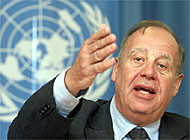UN special envoy warns of apocalyptic consequences of US strikes on Afghanistan

United States military strikes on Afghanistan would have "apocalyptic" consequences on an already war-torn and impoverished nation, says former Swiss parliamentarian, Jean Ziegler, the author of a special United Nations report on world famine.
“Military bombardments would be the end for the Afghan nation,” Ziegler told swissinfo. He called on the international community to “have a heart” for the hundreds of thousands of innocent Afghans either suffering the effects of a five-month-old famine, or those on the road trying to flee to neighbouring countries.
“No matter what you may think of the regime in Kabul – and I don’t think much of it – the primary obligation of the international community is to the Afghan people,” Ziegler told swissinfo.
Ziegler spent many months examining the problem of famine in the world’s poorest countries as a special envoy for the UN report on the “right on food,” which will be published over the next few weeks.
Ziegler’s research for the UN took him to Afghanistan and to neighbouring countries, where he saw the devastating effects which years of civil war, the Soviet invasion and two years of droughts have had on the Afghan people.
He is full of praise for ordinary Afghans, who have wanted to “live in peace” ever since the 1970s, when the monarchy was overthrown, and now have to live with the “very hard” Taliban regime.
Ziegler deplores the current humanitarian crisis in the country, where a mass exodus of Afghans is trying to flee to neighbouring nations that are also impoverished. The author describes the refugee camps in the north west of Pakistan around Peshawar, as “completely overflowed.”
“There are hundreds of thousands of refugees trying to survive in Pakistan’s poorest province,” adds Zeigler. “The incoming refugees find nothing and they are really in a very, very bad situation.”
The question of how the UN should act to help the region is immensely complex, he says. “The reflex of the UN is to help the innocent Afghans, but how this help can be organised in this political climate is the great problem.”
The situation is worsened by the Afghanistan’s mistrust of the UN, ever since the organisation supported an embargo on the country, following Osama bin Laden’s attacks on US embassies in Africa in 1998.
Nevertheless, despite the “difficult relationship” between the UN and Afghanistan, Ziegler is adamant that the organisation should think first about “ordinary Afghans and not about politics.”
by Vanessa Mock

In compliance with the JTI standards
More: SWI swissinfo.ch certified by the Journalism Trust Initiative
You can find an overview of ongoing debates with our journalists here. Please join us!
If you want to start a conversation about a topic raised in this article or want to report factual errors, email us at english@swissinfo.ch.